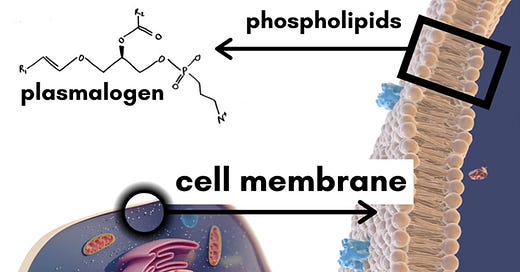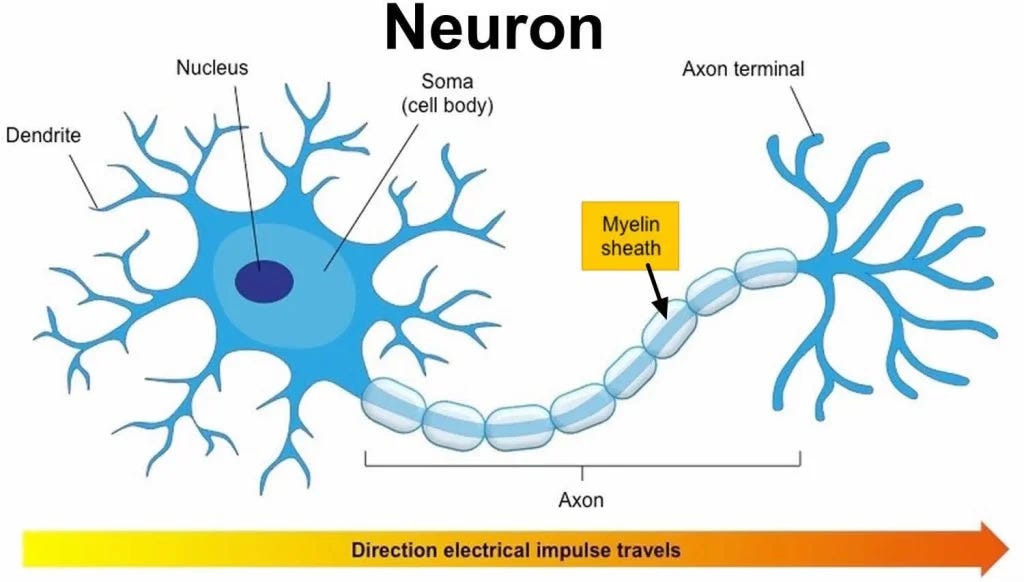The Neuroprotective Power of Plasmalogens
A Vital Tool in the Fight Against Neurological Disorders
In recent years, science has uncovered a fascinating group of lipids that are now being recognized as one of the most essential elements for optimal brain function: plasmalogens. These unique molecules play a critical role in maintaining brain health and protecting against neurodegeneration, yet they are often overlooked in both mainstream medicine and wellness communities. For individuals and families affected by neurological conditions like Alzheimer's, Parkinson's, ALS, Autism, and other neurodegenerative disorders, understanding the benefits of plasmalogens could be life-changing.
What Are Plasmalogens?
Plasmalogens are a special type of phospholipid found abundantly in the brain, heart, and immune cells. They are integral components of cell membranes and are especially critical for the structure and function of neurons. Unlike typical lipids, plasmalogens contain a unique vinyl ether bond that makes them highly effective at protecting cells from oxidative stress.
What Is Their Purpose in the Body?
Plasmalogens serve multiple vital functions:
Protect against oxidative damage by scavenging reactive oxygen species (ROS)
Maintain membrane fluidity and integrity in brain cells
Support mitochondrial function and energy metabolism
Facilitate neurotransmitter release and synaptic activity
Promote myelin sheath integrity, which is crucial for nerve signaling and insulation
How Oxidative and Environmental Stressors Deplete Plasmalogens
Environmental toxins, heavy metals, chronic inflammation, poor diet, and aging can all contribute to the depletion of plasmalogens. Oxidative stress, caused by pollutants, EMFs, poor detoxification, and processed foods, breaks down the fragile vinyl ether bond in plasmalogens, leading to their decline in tissues, especially the brain.
How Does It Affect Myelin?
Myelin is the protective coating around nerve fibers, essential for efficient communication between neurons. Plasmalogens are major structural components of myelin membranes, and their depletion results in compromised nerve conduction, neuroinflammation, and increased vulnerability to neurological damage.
Plasmalogen Depletion and Neurological Disorders
Plasmalogen deficiency has been observed in a wide range of neurodegenerative and developmental conditions:
Alzheimer's Disease: Low levels are found in the hippocampus and cortex… regions responsible for memory and cognition.
Parkinson's Disease: Reduced plasmalogens contribute to impaired dopamine function and mitochondrial health.
ALS (Amyotrophic Lateral Sclerosis): Mitochondrial damage and myelin breakdown are worsened by plasmalogen loss.
Autism Spectrum Disorder: Plasmalogen depletion may contribute to neuroinflammation, impaired neurotransmission, and reduced myelin integrity.
Multiple Sclerosis and Dementia: Both are marked by myelin degradation and chronic neuroinflammation, areas directly influenced by plasmalogen availability.
How Can Supplemental Plasmalogens Help?
Supplemental plasmalogens — due to the fragility of the plasmalogen vinyl ether bond, most natural sources of plasmalogens are degraded by stomach acids before they can be absorbed. To circumvent this problem, nature has come up with a solution, called alkylglycerols, which are plasmalogen precursors. Human breast milk (but not cow’s milk) contains high concentrations of these plasmalogen precursors and it is believed that this is why children who are breastfed have better brain development and lower rates of autism than children who were formula-fed. Alkylglycerol supplements are being studied and used to restore depleted levels, particularly in neurological and age-related conditions. Benefits of alkylglycerol supplementation include:
Improved cognitive function and memory
Reduced neuroinflammation and oxidative stress
Enhanced mitochondrial energy production
Better myelin repair and nerve signaling
Protection against age-related neurodegeneration
Clinical studies and anecdotal evidence show that consistent plasmalogen supplementation may help slow the progression of degenerative diseases and improve quality of life.
Other Holistic Approaches to Neurological Healing
While plasmalogens are a powerful tool, comprehensive healing often requires a multifaceted approach:
Clean Nutrition: Anti-inflammatory, high-fat (good fats), low-sugar, nutrient-dense diets like Paleo, Mediterranean, or Whole30.
Detoxification Support: Glutathione, binders, saunas, and liver-supporting herbs.
Gut Healing Protocols: Probiotics, prebiotics, and eliminating food intolerances (like gluten, dairy, and soy).
Mitochondrial Support: CoQ10, PQQ, NAD+, and B vitamins.
Red Light Therapy: Shown to reduce inflammation and support brain function.
Hyperbaric Oxygen Therapy (HBOT): Improves oxygenation and neurological recovery.
Stem Cell & Peptide Therapy: Targets cellular repair and regeneration.
Spiritual & Emotional Healing: Meditation, prayer, and nervous system regulation to reduce stress and inflammation.
Dr. Dayan Goodenowe and the Prodrome Program
Recently, I had the privilege of meeting Dr. Dayan Goodenowe, a pioneer in plasmalogen research and the creator of Prodrome Sciences. Dr. Goodenowe’s work has focused on restoring neurological function and overall health by addressing plasmalogen deficiencies at the cellular level. His innovative Prodrome program includes precise biochemical testing and targeted supplementation designed to correct lipid imbalances and support brain function.
His supplements, such as ProdromeGLIA, are specifically formulated to restore plasmalogen levels and have shown promise in supporting cognition, memory, and neurological repair in both aging populations and individuals with neurodevelopmental disorders like autism. To learn more, visit www.drgoodenowe.com and www.prodrome.com.
Use promo code Autismhealth25 to receive 25% off any Prodrome supplements.
Conclusion
The emerging science on plasmalogens underscores how foundational these lipids are to neurological resilience. In an era where neurological conditions are rapidly increasing, plasmalogen supplementation offers a safe, natural, and promising intervention to restore brain health and prevent degeneration.
For families affected by autism, dementia, and other neurological challenges, integrating plasmalogens with a functional medicine approach could be a key to meaningful, long-term recovery.
www.AutismHealth.com and www.WarriorMom.com
Always consult with a qualified healthcare provider before beginning any new supplement protocol.





